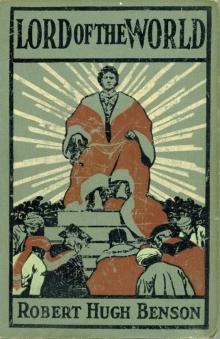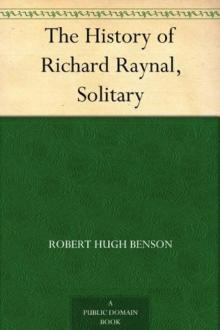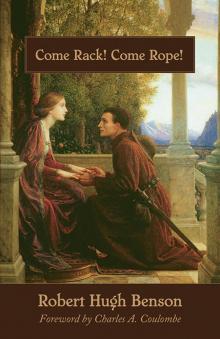- Home
- Robert Hugh Benson
Come Rack, Come Rope Page 11
Come Rack, Come Rope Read online
Page 11
So the young man sat, with that moody look on his face, until Marjorie came back, wondering what news he would have from Mr. Ballard, and whether the plan, at present only half conceived, was to go forward or be dropped. He was willing enough, as has been said, to work for priests, and he had been perfectly sincere in his begging Marjorie to come with him for that very purpose; but there was another work which he thought still more urgent.… However, that was not to be Marjorie’s affair.… It was work for men only.
“Here they are,” she said, holding out the packet.
He took them and thanked her.
“I may read them at my leisure? I may take them with me?”
She had not meant that, but there was no help for it now.
“Why, yes, if you wish,” she said. “Stay; let me show you which they are. You may not wish to take them all.”
The letters were written on stout white paper, each occupying one side of a sheet that was folded three or four times, sealed, and inscribed to “Mistress Marjorie Manners” in the middle, with the word “Haste” in the lower corner. The first was written within a week of Robin’s coming to Rheims, and told the tale of the sailing, the long rides that followed it, the pleasure the writer found at coming to a Catholic country. But names and places were scrupulously omitted. Dr. Allen was described as “my host”; and, in more than one instance, the name of a town was inscribed with a line drawn beneath it to indicate that this was a kind of alias.
The second letter gave some account of the life lived in Rheims—was a real boy’s letter—and this was more difficult to treat with discretion. It related that studies occupied a certain part of the day; that “prayers” were held at such and such times, and that the sports consisted chiefly of a game called “Cat.”
So with the eight or nine that followed. The third and fourth were bolder, and spoke of certain definitely Catholic practices—of prayers for the conversion of England, and of Mass said on certain days for the same intention. It seemed as if the writer had grown confident in his place of security. But later, again, his caution returned to him, and he spoke in terms so veiled that even Marjorie could scarcely understand him. Yet, on the whole, the letters, if they had fallen into hostile hands, would have done no irreparable injury; they would only have indicated that a Catholic living abroad, in some unnamed university or college, was writing an account of his life to a Catholic named Mistress Marjorie Manners, living in England.
When the girl had finished her explaining, it was evident that there was no longer any need for Anthony to take them with him. He said so.
“Ah! but take them, if you will,” cried the girl.
“It would be better not. You have them safe here. And——”
Marjorie flushed. She felt that her ruse had been too plain.
“I would sooner you took them,” she said. “You can read them at your leisure.”
So he accepted, and slipped them into his breast with what seemed to the girl a lamentable carelessness. Then he stood up.
“I must go,” he said. “And I have never asked after Mistress Manners.”
“She is abed,” said the girl. “She has been there this past month now.”
She went with him to the door, for it was not until then that she was courageous enough to speak as she had determined.
“Mr. Babington,” she said suddenly.
He turned.
“I have been thinking while we talked,” she said. “You think my coming to London would be of real service?”
“I think so. It would be good for you to meet these priests before they——”
“Then I will come, if my mother gives me leave. When will you go?”
“We should be riding in not less than a week from now. But, mistress——”
“No, I have thought of it. I will come—if my mother gives me leave.”
He nodded briskly and brightly. He loved courage, and he understood that this decision of hers had required courage.
“Then my sister shall come for you, and——”
“No, Mr. Babington, there is no need. We shall start from Derby?”
“Why, yes.”
“Then my maid and I will ride down there and sleep at the inn, and be ready for you on the day that you appoint.”
When he was gone at last she went back again to the parlour. She was in an agony lest she had been unmaidenly in determining to go so soon as she heard that Robin was to be there.
CHAPTER II
I
ANTHONY LIFTED his whip and pointed.
“London,” he said.
Marjorie nodded; she was too tired to speak.
The journey had taken them some ten days, by easy stages; each night they had slept at an inn, except once, when they stayed with friends of the Babingtons and had heard Mass. They had had the small and usual adventures: a horse had fallen lame; a baggage-horse had bolted; they had passed two or three hunting-parties; they had been stared at in villages and saluted, and stared at and not saluted.
They were a small party for so long a journey—the three with four servants—two men and two maids: the men had ridden armed, as the custom was; one rode in front, then came the two ladies with Anthony; then the two maids, and behind them the second man. In towns and villages they closed up together lest they should be separated, and then spread out once more as the long, straight track lengthened before them. Anthony and the two men-servants carried each a case of dags or pistols at the saddle-bow, for fear of highwaymen. But none had troubled them.
A strange dreamlike mood had come down on Marjorie. At times it seemed to her in her fatigue as if she had done nothing all her life but ride; at times, as she sat rocking, she was living still at home, sitting in the parlour, watching her mother; the illusion was so clear and continuous that its departure, when her horse stumbled or a companion spoke, was as an awaking from a dream. At other times she looked about her; talked; asked questions.
She found Mistress Alice Babington a pleasant friend, some ten years older than herself, who knew London well, and had plenty to tell her. She was a fair woman, well built and active; very fond of her brother, whom she treated almost as a mother treats a son; but she seemed not to be in his confidence, and even not to wish to be; she thought more of his comfort than of his ideals. She was a Catholic, of course, but of the quiet, assured kind, and seemed unable to believe that anyone could seriously be anything else; she seemed completely confident that the present distress was a passing one, and that when politics had run their course, it would presently disappear.
Though Marjorie had nodded only when the spires of London shone up suddenly in the evening light, a sharp internal interest awakened in her. It was as astonishing as a miracle that the end should be in sight; the past ten days had made it seem to her as if all things which she desired must eternally recede.… She touched her horse unconsciously, and stared out between his ears, sitting upright and alert again.
It was not a great deal that met the eye, but it was so disposed as to suggest a great deal more. Far away to the right lay a faint haze, and in it appeared towers and spires, with gleams of sharp white here and there, where some tall building rose above the dark roofs. To the left again appeared similar signs of another town—the same haze, towers and spires—linked to the first. She knew what they were; she had heard half a dozen times already of the two towns that made London—running continuously in one long line, however, which grew thin by St. Mary’s Hospital and St. Martin’s, she was told—the two troops of houses and churches that had grown up about the two centres of Court and City, Westminster and the City itself. But it was none the less startling to see these with her proper eyes.
Presently, in spite of herself, as she saw the spire of St. Clement’s Dane, where she was told they must turn City-wards, she began to talk, and Anthony to answer.
II
The “Red Bull” was like other inns. A curved archway opened on the narrow street; and beneath this they rode, to find themselves i
n a paved court, already lighted, surrounded by window-pierced walls, and high galleries to right and left. The stamping of horses from the further end; and, almost immediately, the appearance of a couple of hostlers, showed where the stables lay. Beside it Marjorie could see through the door of the brightly-lit bake-house.
She was terribly stiff, as she limped up the three or four stairs that led up to the door of the living-part of the inn; and she was glad enough to sit down in a wide, low parlour with her friend as Mr. Babington went in search of the host. The room was lighted only by a fire leaping in the chimney; and she could make out little, except that pieces of stuff hung upon the walls, and a long row of metal vessels and plates were ranged in a rack between the windows.
“It is a quiet inn,” said Alice. Marjorie nodded again. She was too tired to speak; and almost immediately Anthony came back, with a tall, clean-shaven, middle-aged man, in an apron, following behind.
“It is all well,” he said. “We can have our rooms and the parlour complete. These are the ladies,” he added.
The landlord bowed a little, with a dignity beyond that of his dress.
“Supper shall be served immediately, madam,” he said, with a tactful impartiality towards them both.
They were indeed very pleasant rooms; and, as Anthony had described them to her, were situated towards the back of the long, low house, on the first floor, with a private staircase leading straight up from the yard to the parlour itself. The sleeping-rooms, too, opened upon the parlour; that which the two ladies were to occupy was furthest from the yard, for quietness’ sake; that in which Anthony and his man would sleep, upon the other side. The windows of all three looked straight out upon a little walled garden that appeared to be the property of some other house. The rooms were plainly furnished, but had a sort of dignity about them, especially in the carved woodwork about the doors and windows. There was a fireplace in the parlour, plainly a recent addition; and a maid rose from kindling the logs and turf, as the two ladies came back after washing and changing.
A table was already laid, lit by a couple of candles: it was laid with fine napery, and the cutlery was clean and solid. Marjorie looked round the room once more; and, as she sat down, Anthony came in, still in his mud-splashed dress, carrying three or four letters in his hands.
“News,” he said.… “I will be with you immediately,” and vanished into his room.
When Anthony came back, the supper was all laid out. He had given orders that no waiting was to be done; his own servants would do what was necessary. He had a bright and interested face, Marjorie thought; and the instant they were sat down, she knew the reason of it.
“We are just in time,” he said. “These letters have been lying here for me the last week. They will be here, they tell me, by to-morrow night. But that is not all——”
He glanced round the dusky room; then he laid down the knife with which he was carving; and spoke in a yet lower voice.
“Father Campion is in the house,” he said.
His sister started.
“In the house? … Do you mean——”
He nodded mysteriously, as he took up the knife again.
“He has been here three or four days. And I have spoken with him; he is coming here after supper. He had already supped.”
Marjorie leaned back in her chair; but she said nothing. From beneath in the house came the sound of singing, from the tavern parlour where boys were performing madrigals.
It seemed to her incredible that she should presently be speaking with the man, whose name was already affecting England as perhaps no priest’s name had ever affected it. He had been in England, she knew, a comparatively short time; yet in that time, his name had run like fire from mouth to mouth. To the minds of Protestants there was something almost diabolical about the man; he was here, he was there, he was everywhere, and yet, when the search was up, he was nowhere. Tales were told of his eloquence that increased the impression that he made a thousandfold; it was said that he could wile birds off their branches and the beasts from their lairs; and this eloquence, it was known, could be heard only by initiates, in far-off country houses, or in quiet, unsuspected places in the cities. He preached in some shrouded and locked room in London one day; and the next, thirty miles off, in a cow-shed to rustics. And his learning and his subtlety were equal to his eloquence: her Grace had heard him at Oxford years ago, before his conversion; and, it was said, would refuse him nothing, even now, if he would but be reasonable in his religion; even Canterbury, it was reported, might be his. And if he would not be reasonable—then, as was fully in accordance with what was known of her Grace, nothing was too bad for him.
Such feeling then, on the part of Protestants, found its fellow in that of the Catholics. He was their champion, as no other man could be. Had he not issued his famous “challenge” to any and all of the Protestant divines, to meet them in any argument on religion that they cared to select, in any place and at any time, if only his own safe-conduct were secure? And was it not notorious that none would meet him? He was, indeed, a fire, a smoke in the nostrils of his adversaries, a flame in the hearts of his friends. Everywhere he ranged, he and his comrade, Father Persons, sometimes in company, sometimes apart; and wherever they went the Faith blazed up anew from its dying embers, in the lives of rustic knave and squire.
And she was to see him!
“He is here for four or five days only,” went on Anthony presently, still in a low, cautious voice. “The hunt is very hot, they say. Not even the host knows who he is; or, at least, makes that he does not. He is under another name, of course; it is Mr. Edmonds, this time. He was in Essex, he tells me; but comes to the wolves’ den for safety. It is safer, he says, to sit secure in the midst of the trap, than to wander about its doors; for when the doors are opened he can run out again, if no one knows he is there.…”
III
When supper was finished at last, and the maids had borne away the dishes, there came almost immediately a tap upon the door; and before any could answer, there walked in a man, smiling.
He was of middle size, dressed in a dark, gentleman’s suit, carrying his feathered hat in his hand, with his sword. He appeared far younger than Marjorie had expected—scarcely more than thirty years old, of a dark and yet clear complexion, large-eyed, with a look of humour; his hair was long and brushed back; and a soft, pointed beard and moustache covered the lower part of his face. He moved briskly and assuredly, as one wholly at his ease.
“I am come to the right room?” he said. “That is as well.”
His voice, too, had a ring of gaiety in it; it was low, quite clear and very sympathetic; and his manners, as Marjorie observed, were those of a cultivated gentleman, without even a trace of the priest. She would not have been astonished if she had been told that the man was of the court, or some great personage of the country. There was no trace of furtive hurry or of alarm about him; he moved deftly and confidently; and when he sat down, after the proper greetings, crossed one leg over the other, so that he could nurse his foot. It seemed more incredible even than she had thought, that this was Father Campion!
“You have pleasant rooms here, and music to cheer you, too,” he said. “I understand that you are often here, Mr. Babington.”
Anthony explained that he found them convenient and very secure.
“Roberts is a prudent landlord,” he said.
Father Campion nodded.
“He knows his own business, which is what few landlords do, in these degenerate days; and he knows nothing at all of his guests’. In that he is even more of an exception. And so, God blesses him in those who use his house.”
They talked for a few minutes in this manner. Father Campion spoke of the high duty that lay on all country ladies to make themselves acquainted with the sights of the town; and spoke of three or four of these. Her Grace, of course, must be seen; that was the greatest sight of all. They must make an opportunity for that; and there would surely be no difficulty, since her G
race liked nothing better than to be looked at. And they must go up the river by water, if the weather allowed, from the Tower to Westminster; not from Westminster to the Tower, since that was the way that traitors came, and no good Catholic could, even in appearance, be a traitor. And, if they pleased, he would himself be their guide for a part of their adventures. He was to lie hid, he told them; and he knew no better way to do that than to flaunt as boldly as possible in the open ways.
“If I lay in my room,” said he, “with a bolt drawn, I would soon have some busy fellow knocking on the door to know what I did there. But if I could but dine with her Grace, or take an hour with Mr. Topcliffe, I should be secure for ever.”
Marjorie glanced shyly towards Alice, as if to ask a question. (She was listening, it seemed to her, with every nerve in her tired body.) The priest saw the glance.
“Mr. Topcliffe, madam? Well; let us say he is a dear friend of the Lieutenant of the Tower, and has, I think, lodgings there just now. And he is even a friend of Catholics, too—to such, at least, as desire a heavenly crown.”
“He is an informer and a tormentor!” broke in Anthony harshly.
“Well, sir; let us say that he is very loyal to the letter of the law; and that he presides over our Protestant bed of Procrustes.”

 The Dawn of All
The Dawn of All By What Authority?
By What Authority? The King's Achievement
The King's Achievement Lord of the World
Lord of the World The History of Richard Raynal, Solitary
The History of Richard Raynal, Solitary Come Rack, Come Rope
Come Rack, Come Rope